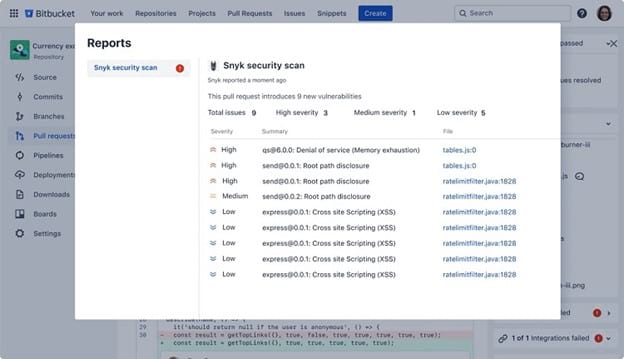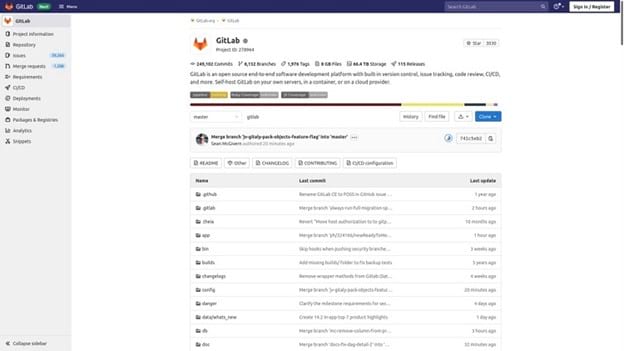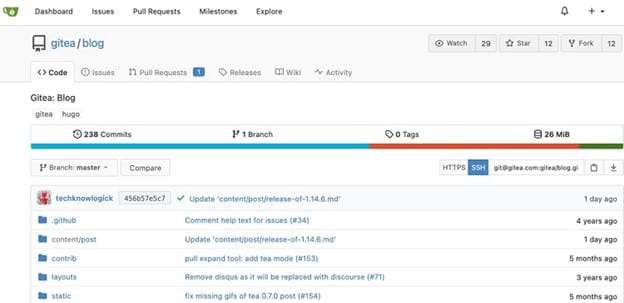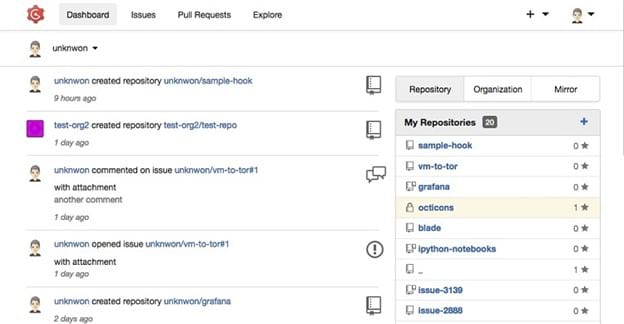Best Git Hosting Services
When you are looking for the best Git hosting services, there are a few options that clearly lead the market. However, some of the other hosts may fit your needs better.
Any Git hosting service will be able to serve as the web host and archive for your source code. However, certain services may provide extra features and a greater value for your particular needs, such as bug tracking, collaboration options, and wiki project documentation.
We will break down the key features of each of the five best Git hosting services to help you decide which one is the best option for you.
GitHub

If you like the idea of selecting a Git hosting service that has a track record of success and that has a significant user base – in other words, a service that your fellow developers already trust – GitHub is the answer. GitHub claims to have more than 73 million developers using it with more than 200 million repositories stored.
Beyond its hosting services, GitHub provides an opportunity for developers to manage their projects, simplifying the process of coordinating workflows and setting deadlines. You can host static websites and blogs directly from your GitHub repositories.
Developers have the ability to create a public project repository that is available for collaboration with the entire open source community that is using GitHub. Additionally, GitHub allows for private repositories, where only your team members will be able to see and make changes to the code. Because of some security concerns, GitHub is a better selection for those looking to make use of public repositories, rather than private repositories.
Versus competitors, GitHub’s hosting services allow you to store all of your code and related documentation in the same place in the cloud. This simplifies the process of hosting the code. Additionally, you can host and release your code from any single repository.
For those who only need the basics from GitHub, it has a strong free version that you can continue to use indefinitely.
For its subscription tiers, its price points are a bit higher than some others, especially considering that it charges by the user. Consequently, you may have a tough time fitting it into a smaller budget. This is especially important if you want to host GitHub on your own server, as this capability is only available in the highest-priced Enterprise tier.
Additionally, Microsoft purchased GitHub in 2018, which disappointed some developers, especially those who favor the open-source software development process that some other Git hosting services offer.
Despite some drawbacks, in our GitHub review we gave this Git hosting service a strong recommendation for developers. We understand it isn’t quite perfect, but it is the most popular Git hosting service for a good reason.
Pros
- Has a long track record you can trust
- Makes it easy to manage versions
- Offers both public and private repositories, but excels in public repositories
- Easy to host public projects open to the open-source community
- The most popular Git hosting service
Cons
- Some people don’t like that Microsoft purchased GitHub a few years ago
- Charges by the user, so it can be pricey for large organizations
Pricing
- Free: The Free tier offers up to 2,000 CI/CD (continuous integration/continuous delivery) minutes per month
- Team: The Team tier costs $4 per user per month and offers 3,000 CI/CD minutes per month
- Enterprise: The Enterprise tier costs $21 per user per month and offers up to 50,000 CI/CD minutes per month
Bitbucket

Bitbucket delivers multiple features for Git hosting, while also bringing the ability to work seamlessly with other software packages from its owner, Atlassian. Because Bitbucket can integrate with software packages like Trello and Jira, it gives teams of developers several collaboration options on their coding projects.
With Bitbucket, teams have a place where they can manage their coding projects from the planning phase through development, testing, and deployment. Teams can host static websites too.
Although the size of Bitbucket’s user base doesn’t quite stack up to GitHub’s user base, it easily is one of the top three Git hosting services. Bitbucket claims more than 10 million registered users and more than 28 million repositories.
Hosting Git projects through Bitbucket means you can host in the cloud, through an on-premises server, or through a data center.
Bitbucket Cloud uses Bitbucket Pipelines as its integrated CI/CD service. The Pipelines tool allows you to build, test, and deploy your code directly from within Bitbucket. With the server version of Bitbucket, you’ll gain access to CI/CD through Bamboo, which integrates closely with Bitbucket Server.
As mentioned earlier, Bitbucket is part of the Atlassian family. If you prefer a completely open-source option for hosting your Git project, you will want to look elsewhere.
Pros
- Bitbucket offers a lower price point than GitHub
- Offers the built-in Pipelines feature to handle CI/CD when using Bitbucket Cloud
- Offers Bamboo to handle CI/CD when using Bitbucket Server
- Operates seamlessly with other Atlassian tools like Trello and Jira
- Free version available
Cons
- Atlassian owns Bitbucket, which some developers won’t like
- Doesn’t work as well with public repositories as it does with private repositories
Pricing
- Free: No cost for up to five users and up to 50 build minutes per month
- Standard: $3 per month per user and up to 2,500 build minutes per month
- Premium: $6 per month per user and up to 3,500 build minutes per month
GitLab

Of the three largest Git hosting services, GitLab fits in the middle. It claims more than 30 million registered users, although it is difficult for GitLab to estimate the actual number of users because it is a fully open-source type of product.
GitLab delivers the ability to plan, release, and monitor your coding project. You can make sure your entire team stays on task and understands the upcoming deadlines with the planning tools GitLab offers. It delivers an end-to-end coding and project development platform, providing a CI/CD tool, issue tracing, and version control, among other features.
GitLab offers basic functionality in its free tier, as it is an open-source project running under the Massachusetts Institute of Technology (MIT) license.
Should you want advanced customer support options, application security testing, and pipeline graphs to track multiple projects, you will need to pay for one of the subscription tiers. GitLab also offers container host monitoring, which will block malicious or unusual activity from affecting your containers, in its subscription tiers.
With GitLab, you have the option of using the cloud to host your projects, or you can self-host GitLab on a virtual private server (VPS) or through an on-prem server. Because GitLab is an open-source software option, you can download it to your own server at any time you want.
Should you want to make the switch from GitHub to GitLab, migrating your GitHub repositories over to GitLab is an easy process. Developers often will find that GitHub and GitLab are the two closest hosting services in terms of how they work and in terms of services, so it is easier to migrate between these two than it is to migrate to another Git hosting option. People who dislike the fact that Microsoft owns GitHub may prefer the fully open-source process with GitLab.
Pros
- GitLab offers excellent integration for its CI/CD tool
- Security features are better than average versus other Git hosting services, offering security through the entire process
- Delivers versatility to handle both large and small projects
- Works in the cloud, with your own on-prem server, or with VPS
- A larger company does not own GitLab; it is a fully open-source option and runs through its own publicly-traded company
Cons
- Pricing can add up very quickly for large teams
- It doesn’t have the customer support or self-help support options of GitHub or Bitbucket
Pricing
- Free: No cost for individual users and up to 400 CI/CD minutes per month
- Premium: $19 per user per month and up to 10,000 CI/CD minutes per month
- Ultimate: $99 per user per month and up to 50,000 CI/CD minutes per month
Gitea

Gitea doesn’t offer a large user base compared to the three biggest Git hosting services. However, it yields nice versatility for those seeking a completely free Git hosting service option.
If you want to use Gitea in the cloud, you will need to make use of a third-party cloud hosting provider that can run Gitea. The Gitea service does not offer an all-in-one cloud hosting service like the first three options on our list. You also can download Gitea yourself and run it through an on-premises server or through a VPS. This is a common use case for those using Gitea.
Gitea’s greatest strength is its ability to run without requiring significant computing resources. It makes use of the Go language to create a simple piece of open-source software that can run on any operating system and on almost any computing configuration.
Pros
- Gitea is a lightweight piece of software, meaning it won’t demand many computing resources
- Its interface is similar to GitHub, so those making the switch will not have a steep learning curve
- Offers both self-hosting and cloud-hosting options
Cons
- Doesn’t offer much in the way of technical help
- Doesn’t offer the advanced features you’d find in the pay tiers of GitHub, Bitbucket, or GitLab
Pricing
Gitea is open-source software that’s free to use.
Gogs

Gogs is another self-hosted option, and its feature set and capabilities are similar to Gitea. It does not require many computing resources to run, making it able to run on even a bare-bones computing setup, such as a Raspberry Pi. Like Gitea, it makes use of the Go language, which allows it to run on almost any operating system, including Windows, Mac, or Linux.
Downloading and using Gogs on your own server is the most common use case. It’s made to be as stable as possible, while also simplifying the setup process. It works especially well for smaller teams or individuals running code who need stability.
The Gogs interface has quite a few similarities to the GitHub interface. If you are making the switch from GitHub to Gogs, you should be able to do so pretty easily without needing a long time to learn how to use it. If you are looking to have a simple, self-hosted Git solution up and running quickly, Gogs is one of the best options.
Pros
- Does not require many computing resources to function
- Extremely easy to set up and use, so you can be up and running quickly
- It is a fully open-source software package, so anyone can make changes to the source code
Cons
- Doesn’t have the same level of advanced features that you would find on Bitbucket, GitLab, or GitHub
- Not as easy to run on a third-party’s cloud server as the others on the list
Pricing
Gogs is open-source software that’s free.
How to Pick the Best Git Hosting Services
When seeking the best Git hosting service, follow the steps here to make sure you are receiving the features and capabilities you need.
Step 1 – Determine Your Budget
Start your search for the best Git hosting service for your particular needs by determining how much money, if any, you have available to spend on the process. The prices for Git hosting services are typically charged per user.
Even if you don’t really have a budget for your coding project, you have multiple options for free hosting. All of our listed Git hosting services options are either completely free or offer a free tier. You won’t receive the highest level of customer service or advanced management features in the free tiers of the three largest Git hosting options (Bitbucket, GitHub, or GitLab), but plenty of developers adequately make use of the free options.
You often can make use of self-help documentation with the free tiers of these options, and you can seek help from other users in the community.
With some of the smaller open source hosting options on our list, you won’t have any direct cost to use the software. However, you may have to host the software on your own server.
Step 2 – Determine Your Needs for Public or Private Hosting
Git hosting services often will give you the option of creating a public project or a private project. If you are creating a coding project that will be proprietary, you will want to be able to make use of private repositories.
With public repositories, you have the ability to share your code and project with anyone else on the site. This means you are seeking collaboration with others on improving your code, and they will be able to make changes to your code on their own through open-source coding.
Bitbucket is the best option among the top three Git hosting services for making use of private repositories, although it can use public repositories too. GitHub, meanwhile, works better with public repositories, but it also offers support for private repositories. GitLab works well with both public and private repositories.
Step 3 – Determine Your Needs for the Hosting Location
Finally, determine exactly how you want your Git hosting service to operate. First, you can choose to have the Git hosting service host your repositories and websites in the cloud. As another option, you can download the software and host it on your on-prem server or on a VPS server.
Because GitLab is open source software, this simplifies the process of downloading it and hosting it on your own server. GitHub and Bitbucket both make hosting your blog or static website using your repositories in the cloud extremely easy. Gitea and Gogs work far better when running them on your own server.

